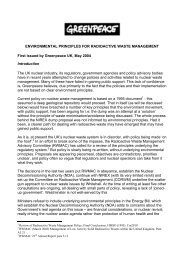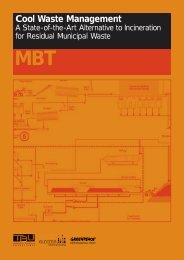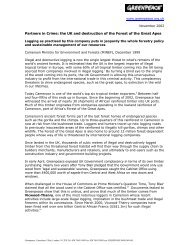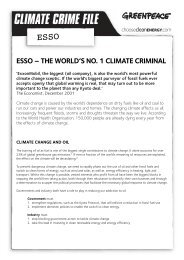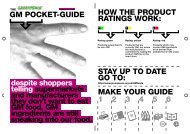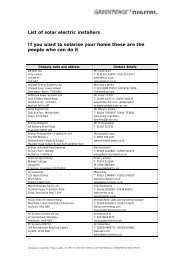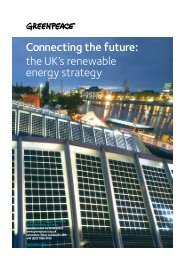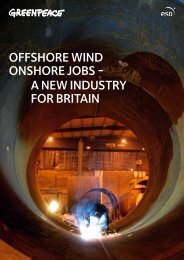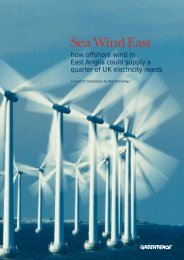EXXON'S WEAPONS OF MASS DECEPTION - Greenpeace UK
EXXON'S WEAPONS OF MASS DECEPTION - Greenpeace UK
EXXON'S WEAPONS OF MASS DECEPTION - Greenpeace UK
Create successful ePaper yourself
Turn your PDF publications into a flip-book with our unique Google optimized e-Paper software.
1998 with Ansel Condray, Bush claimed that he already had 26 industry volunteers<br />
for his Clean Air Programme signed up. By the end of that year however, only three<br />
companies had actually reduced emissions, and then only by a sixth of the promised<br />
amount. Ansel Condray is now head of Esso <strong>UK</strong>.<br />
Bush’s route to office was paved with oil money, and Exxon gave more than any<br />
other oil company to the Republicans in 2000 – over $1 million. Of its total political<br />
donations for that year, 89% went to the Republicans.<br />
With the announcement of President Bush’s cabinet in January, it emerged that over<br />
half the members (including Vice President Cheney) were drawn from the oil and<br />
gas industry. Bush’s under secretary for Economic Affairs in the Commerce<br />
Department was the former Chief Economist for Exxon, Kathleen Cooper. Lobbying<br />
soon began in earnest to get Bush to withdraw the US from the Kyoto protocol. Two<br />
days before the President’s inauguration, Exxon published advertisements in the US<br />
press outlining its recommendations for ‘An Energy Policy for the New<br />
Administration’ which stated that ‘the unrealistic and economically damaging Kyoto<br />
process needs to be rethought.’ Another more recent advertisement declared that ‘the<br />
Kyoto Protocol would be a serious mistake’. Exxon gave $100,000 to Bush’s inaugural<br />
fund.<br />
Following Bush’s statement in March 2001 of his formal opposition to the Kyoto<br />
Protocol, the American Petroleum Institute – of which Exxon is a key player - wrote<br />
a letter of support to the Chair of the Energy and Air Quality Subcommittee,<br />
Congressman Joe Barton. Importantly, the letter indicated that the API had been<br />
asked by Barton for its view on the status of the international negotiations to<br />
implement the Kyoto protocol on 26 March, days before Bush’s climb-down.<br />
In October 2001, Mr Rene Dahan, Executive Vice President ExxonMobil, predicted<br />
that the long-promised US Government’s alternative to Kyoto, ‘will not be very<br />
different from what you are hearing from us’.<br />
On 22 January 2002 Lee Raymond spent an hour at No. 10 Downing Street with <strong>UK</strong><br />
Prime Minister, Tony Blair. A senior government official later told The Guardian<br />
newspaper that Raymond's visit was designed to persuade Blair to support Bush’s<br />
alternative to Kyoto which was about to be announced.<br />
George Bush unveiled his plan in February 2002. It mirrored every Exxon policy on<br />
climate change. Bush’s approach is entirely voluntary and would result in an<br />
increase in US carbon emissions of around 29% on 1990 levels. By 2012, US<br />
emissions would be allowed to rise by between 22% and 57%.<br />
Having succeeded in getting the US to withdraw from the Kyoto Protocol,<br />
ExxonMobil is now lobbying to get the Canadian Government to reject the treaty. In<br />
March 2002, Bob B. Peterson, the Chairman and CEO of Imperial Oil, the<br />
ExxonMobil subsidiary in Canada, told the journalists, ‘Kyoto is an economic entity. It<br />
has nothing to do with the environment. It has to do with world trade. This is a wealthtransfer<br />
scheme between developed and developing nations. And it's been couched and<br />
clothed in some kind of environmental movement. That's the dumbest-assed thing I've heard<br />
in a long time.’


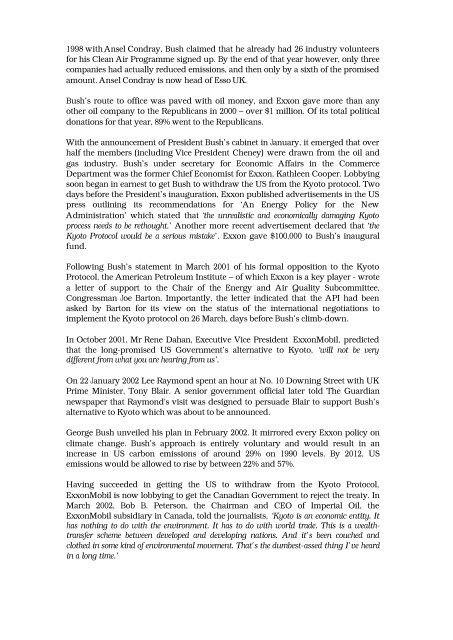
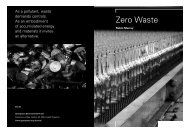
![[2007] EWHC 311 - Greenpeace UK](https://img.yumpu.com/22079793/1/184x260/2007-ewhc-311-greenpeace-uk.jpg?quality=85)

